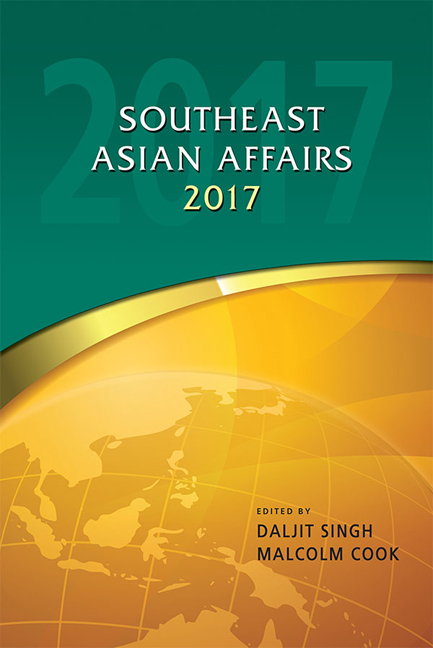Introduction
Published online by Cambridge University Press: 12 January 2018
Summary
In the post–Cold War era, 2016 could well stand out as a watershed year for the global order, the Southeast Asian region, and many Southeast Asian states. Events in 2016 saw sharp new changes that may create new continuities going forward within Southeast Asian states and changes within long-term structural continuities that will have important ramifications for Southeast Asia.1 As suggested by the title of this volume, the events of 2016 covered in the twenty-four chapters by twenty-eight authors will have a determining influence on the trajectories of Southeast Asia and the countries of the region in 2017 and beyond.
Structural Factors
U.S.–China Rivalry
The first regional chapter, by Alice Ba, focuses on a defining post–Cold War strategic continuity for Southeast Asian security and states’ foreign and security policies: the strategic rivalry between the United States as the declining status quo power and China as the rising revisionist power. As Ba discusses, Donald Trump's victory in the November 2016 U.S. presidential election is a significant change on the U.S. side of this rivalry with unknown but likely profound importance for the U.S. role in Southeast Asia and Southeast Asian states’ relations with the United States. At the same time, the author analyses how 2016 saw China become more assertive in its push to develop an alternate China-centred regional order and against obstacles to the pursuit of its national interests in Southeast Asia. These include the 12 July Arbitral Tribunal ruling invalidating most of China's maritime rights claims in the South China Sea.
The chapter by Andrew Shearer on the future of U.S.–Japan–Australia trilateral security cooperation delves deeper into the strategic ramifications of the U.S.–China rivalry and the common threat of terrorism. Shearer agrees that the Trump victory is a watershed moment for the United States in Asia. Australia and Japan will be under renewed U.S. pressure to contribute more to their respective alliance relationships with the United States. These relationships and the Trilateral Strategic Dialogue process provides Tokyo and Canberra unique communication channels to Washington DC.
- Type
- Chapter
- Information
- Southeast Asian Affairs 2017 , pp. xi - xxPublisher: ISEAS–Yusof Ishak InstitutePrint publication year: 2017

